De Zuid-Afrikaanse schrijver en dichter Breyten Breytenbach werd geboren op 16 september 1936 in Bonnievale. Zie ook mijn blog van 16 september 2006 en ook mijn blog van 16 september 2007 en ook mijn blog van 16 september 2008 en ook mijn blog van 16 september 2009.
Uit: Intimate Stranger
“Poetry is the breath of awareness
However much you feed a wolf, it always looks to the forest. We are all wolves in the dense forest of Eternity.” This was written by the Russian poet Marina Tsvetaeva, the man said softly as he stroked the silver fur of the animal crouched in his arms. The animal pricked up its ears, then strained to look back at the dark copse of trees where shadows moved as if alive. As if alive and waiting to move out into the open.
Listen, this process called poetry is an exercise in imagining memory, and then having that memory snare and cherish imagination. Yet, every poem is and will be a capsule of territory in the perpetual present tense, a vessel taking on the ever-changing colors of the sea.
Poetry is the breath of awareness and the breathing thereof. I even mean this literally, for underlying the flow and the fall of verses are ‘natural units’ of consciousness sculpted by rhythm, by recall, by movement reaching for the edges of meaning and of darkness. One could illustrate by averring that the poem is a membrane, rippling, thrumming; reminding us that we are breathing organisms continually translating the space around us, continually translating ourselves into spaces of the known and thus drawing circumferences around locations of the unknown. From this one could extrapolate that the practice and process of remembering /evoking /awakening events and our selves lead quite naturally to questioning the polarities of other and I, to writing (and un-writing) the self, and toward rewriting the world. The boat changes the water.
Poetry is also the wind of time and thus the movement and singing of being. An old poet friend of mine – now coming to the end of his life and cold to dying, the earth lurching under his unsteady tread as he hides his eyes behind tinted glasses to soften the glaring (maybe the gloating) look of Dog Death sniffing closer – told me the other day that whatever memory and understanding he has of himself, of the route and the roads traveled, of seas navigated, of big H history, he knows through the resonance of a clutch of poems.”
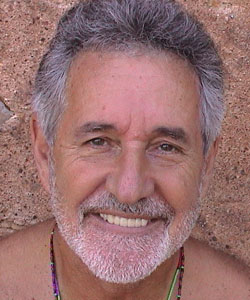
Breyten Breytenbach (Bonnievale, 16 september 1936)
De Amerikaanse schrijver James Alan McPherson werd geboren op 16 september 1943 in Savannah, Georgia. Zie ook mijn blog van 16 september 2009.
Uit: A Loaf of Bread
“It was one of those obscene situations, pedestrian to most people, but invested with meaning for a few poor folk whose lives are usually spent outside the imaginations of their fellow citizens. A grocer named Harold Green was caught red-handed selling to one group of people the very same goods he sold at lower prices at similar outlets in better neighborhoods. He had been doing this for many years, and at first he could not understand the outrage heaped upon him. He acted only from habit, he insisted, and had nothing personal against the people whom he served. They were his neighbors. Many of them he had carried on the cuff during hard times. Yet, through some mysterious access to a television station, the poor folk were now empowered to make grand denunciations of the grocer. Green’s children now saw their father’s business being picketed on the Monday evening news.
No one could question the fact that the grocer had been overcharging the people. On the news even the reporter grimaced distastefully while reading the statistics. His expression said, “It is my job to report the news, but sometimes even I must disassociate myself from it to protect my honor.” This, at least, was the impression the grocer’s children seemed to bring away from the television. Their father’s name had not been mentioned, but there was a close-up of his store with angry black people, and a few outraged whites, marching in groups of three in front of it. There was also a close-up of his name. After seeing this, they were in no mood to watch cartoons. At the dinner table, disturbed by his children’s silence, Harold Green felt compelled to say, “I am not a dishonest man.” Then he felt ashamed. The children, a boy and his older sister, immediately left the table, leaving Green alone with his wife. “Ruth, I am not dishonest,” he repeated to her.
Ruth Green did not say anything. She knew, and her husband did not, that the outraged people had also picketed the school attended by their children. They had threatened to return each day until Green lowered his prices. When they called her at home to report this, she had promised she would talk with him. Since she could not tell him this, she waited for an opening. She looked at her husband across the table.”
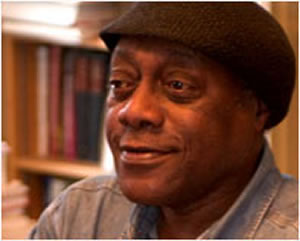
James Alan McPherson (Savannah, 16 september 1943)
De Amerikaanse schrijver Michael Nava werd geboren op 16 september 1954 in Stockton, Calefornië. Zie ook mijn blog van 16 september 2009.
Uit: How Town
“The road to my sister’s house snaked through the hills above Oakland, revealing at each curve a brief view of the bay in the glitter of the summer morning. Along the road, houses stood on small woodsy lots. The houses were rather woodsy themselves, of the post and beam school, more like natural outcroppings than structures. Wild roses dimpled the hillsides, small, blowsy flowers stirring faintly in the trail wind of my car. Otherwise, there was no movement. The sky was cloudless, the weather calm and the road ahead of me clear.
Earlier, coming off the Bay bridge I’d taken a wrong turn and found myself in a neighborhood of small pastel houses. Grafitti-gashed walls and a preternatural calm marked it as gang turf. The papers had been full of gang killings that month. When I drove past, a child walking by herself flinched, ready to take cover. None of that was visible from these heights.
This was like living in a garden, I thought, and other associations came to mind: Eden, paradise, a line from “Sunday Morning” that I murmured aloud: “Is there no change in paradise?” I couldn’t remember the rest. Elena would know. And she would appreciate the irony. She and I had grown up in a neighborhood called Paradise Slough in a town called Los Robles about an hour’s drive from here.
There had been little about our childhood that could be described as paradisiacal. Our alcoholic father was either brutal or sullenly withdrawn. Our mother retaliated with religious fanaticism. As she knelt before plaster images of saints, in the flicker of votive candles, her furious mutter was more like invective than prayer. Their manias kept my parents quite busy, and Elena and I were more or less left to raise ourselves.”
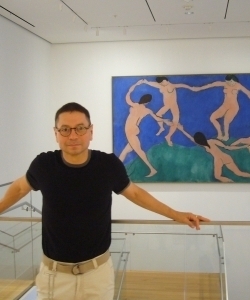
Michael Nava (Stockton, 16 september 1954)
De Frans-Zwitserse kunstenaar, dichter en schrijver Hans (Jean) Arp werd geboren op 16 september 1886 in Straatsburg. Zie ook mijn blog van 16 september 2006. Zie ook mijn blog van 16 september 2008en ook mijn blog van 16 september 2009.
kaspar ist tot
weh unser guter kaspar ist tot
wer trägt nun die brennende fahne im wolkenzopf verborgen täglich zum schwarzen schnippchen schlagen
wer dreht nun die kaffeemühle im urfass
wer lockt nun das idyllische reh aus der versteinerten tüte
wer verwirrt nun auf dem meere die schiffe mit der anrede parapluie und die winde mit dem zuruf bienenvater ozonspindel euer hochwohlgeboren
weh weh weh unser guter kaspar ist tot. heiliger bimbam kaspar ist tot.
die heufische klappern herzzerreissend vor leid in den glockenscheunen wenn man seinen vornamen ausspricht. darum seufze ich weiter seinen familiennamen kaspar kaspar kaspar.
warum hast du uns verlassen. in welche gestalt ist nun deine schöne grosse seele gewandert. bis du ein stern geworden oder eine kette aus wasser an einem heissen wirbelwind oder ein euter aus schwarzem licht oder ein durchsichtiger ziegel an der stöhnenden trommel des felsigen wesens.
jetzt vertrocknen unsere scheitel und sohlen und die feen liegen halbverkohlt auf dem scheiterhaufen.
jetzt donnert hinter der sonne die schwarze kegelbahn und keiner zieht mehr die kompasse und die räder der schiebkarren auf.
wer isst nun mit der phosphoreszierenden ratte am einsamen barfüssigen tisch.
wer verjagt nun den sirokkoko teufel wenn er die pferde verführen will.
wer erklärt uns die monogramme in den sternen
seine büste wird die kamine aller wahrhaft edlen menschen zieren doch das ist kein trost und schnupftabak für einen totenkopf.
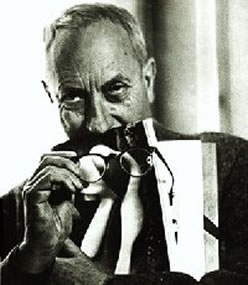
Hans Arp (16 september 1886 – 7 juni 1966)
De Duitse schrijver Andreas Neumeister werd geboren op 16 september 1959 in Starnberg. Zie ook mijn blog van 16 september 2009.
Uit: Könnte Köln sein
„Wenn alle Wege nach Rom führen, dann müssten erst recht auch sämtliche Autobahnen nach Rom führen.
Immerhin zwei der fünf vom am nördlichen Fuß der Alpen gelegenen Basislager in fünf Windrichtungen strebenden Autobahnen führen letztendlich über Brenner und Alpen auf direktem Weg nach Rom Von verschiedenen Moränenhügeln aus den Bau der Garmischer Autobahn mitverfolgt. Bei Exkursionen zu Baustellen immer gerne mit dabei. Operation am offenen Herzen einer bewegten Landschaft. Baustelle mit Alpenblick: Immerhin ist Vater Ingenieur beim Bau der Autobahnbrücke über Loisach und Loisach-Moos gewesen.
Immerhin ist die Ohlstätter Brücke Vaters Lieblingsbaustelle gewesen. (Spannbeton – es kommt darauf an, was man daraus macht.) Karin-Stoiber-Tunnel bei Farchant. Einschlägige Bauten, Olympiade 1936. Garmisch bleibt rechts liegen. Garmisch kann uns gestohlen bleiben. Mittenwald wird aufgeständert umgangen. Kasernen im Heimatschutzstil, Jäger, Gebirgsjäger alles aus der Guten Alten Zeit Großkampfstätten des Wintersports: a.) Garmisch b.) Innsbruck. Die Isar als Wildbach verschwindet unter einer Brücke nach rechts. Seefeld schon auf der Höhe vom Brenner. Der Zirlerberg führt hinunter in den Abgrund.
Vom Seefelder Sattel hinunter nach Innsbruck am Inn. Energieverschwendung. Eine Stadt, die ich als Kind gerne verfluchte. Das Goldene Dachl. Städte in tief eingeschnittenen Tälern gehören verboten. Zum Wohl und Schutz ihrer Bewohner. Die Stadt, ein Flughafen zwischen Inntalautobahn und Brennerautobahnzubringer gequetscht. Die neue Hungerburgbahn: irakische Architektin!“
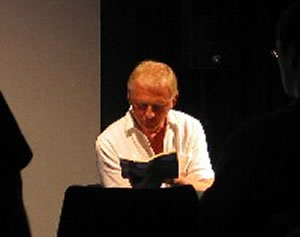
Andreas Neumeister (Starnberg, 16 september 1959)
De Nederlandse schrijfster Anna Bosboom – Toussaint werd geboren op 16 september 1912 te Alkmaar. Zie ook mijn blog van 16 september 2006. Zie ook mijn blog van 16 september 2008 en ook mijn blog van 16 september 2009.
Uit: De Alkmaarsche wees
“Met eene gewaarwording van vroolijke voldoening, doch door weemoed getemperd, zet ik dien titel boven hetgeen ik ga nederschrijven. Voldoening, omdat ik spreken mag van dien eerbiedwaardigen karaktertrek onzer vaderen: zorge en liefde voor het verlatene; trouwe en teêrheid voor het weeskind. Weemoed, omdat de instelling, die ook in onze stad van dien karaktertrek getuigde in mijn tijd heeft opgehouden te bestaan, voor onze Protestantsche weezen; omdat ik niet zonder een blik van benijding en van bewondering, die ik gaarne wil uitspreken, mijne Katholieke stadgenooten uit eigen fondsen en ten koste van welke offers dan ook, zich dat voorrecht zie verzekeren, waarop het menschelijk hart en het vaderlandsch gevoel grooteren prijs hadden behooren te stellen dan zij getoond hebben te doen, die zulke offers te groot hebben geacht. Hunne redenen te wegen of te doorgronden is noodeloos en hier niet oorbaar; maar de klachte, die mij op ’t harte lag, moest ik lucht geven: Geen Gereformeerd weeshuis meer in dàt Alkmaar, dat zich toch niet de mindere toont, als er beroep wordt gedaan op hare goeddadigheid, en dat eene der bloeiendste wordt geacht onder de zeven Westfriesche steden! Dat was het reeds in 1611, als men Schagen en anderen gelooven mag, en …. wat voor ons zijne belangrijkheid heeft, toen bestond er een weeshuis.
Het was Zondag: er is iets eigenaardig aandoenlijks in, op zulken heiligen dag des Heeren, de weezen te zien opgaan naar het huis van Hem, die het gezegd heeft, dat Hij hun Vader wil zijn; er is iets liefelijks in hen te zien komen en gaan in lange statige rij, allen ordelijk en stemmig voortgaande, twee
aan twee, de kleinsten vooruit, soms nog wel aan de hand geleid, de grooteren volgende, de plaatsvervangende vader en moeder met de leermeesteressen den trein sluitende: het geeft u zoo goed een denkbeeld van de stilheid, de aandacht en orde, die de vrome godsdienstige zin met zich brengt.”
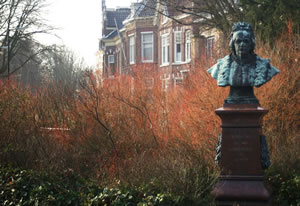
Anna Bosboom – Toussaint (16 september 1812 – 13 april 1886)
Borstbeeld in Alkmaar
De Amerikaanse schrijver Justin Haythe werd geboren op 16 september 1973 in Londen. Zie ook mijn blog van 16 september 2008.
Uit: The Honeymoon
„She had met Marcel somewhere else, in another European city I was too young to remember. That’s what he told me when we met. We stood in the front hallway of his apartment and shook hands. ‘We’ve met before,’ he said. ‘You were small.’ He kissed Maureen on both cheeks and then held her by the shoulders. He said, ‘Look at you.’ She stepped back out of his grasp so that we could look at her. ‘You have a beautiful mother,’ he told me.
This was June of 1980. I was eleven years old and he was leaving for the summer. I have often wondered if he and my mother were sleeping together. He was twenty years older than she was, heavy-set, with a thick moustache. On the train into Paris, Maureen had assured me that Marcel was, in some ways, a great man. But I cannot help remembering his hands on her body, on her clothes where he could feel what she wore underneath.
He showed us to our rooms. He put Maureen in the large bedroom where he slept, where the bed was still unmade, and showed me into the guest room that had once belonged to his daughter, Claudia. There was a single bed, a hand-painted child’s desk and dark carpet. He showed Maureen the priceless artefacts on the shelves that could not be replaced if broken and the wine in the cupboard that had survived both wars and was too precious to be drunk.
Maureen and I sat opposite Marcel at lunch. He gripped the bottle of white wine by the neck, and plunged it back into the ice bucket when the glasses were full. Without turning his head, he gestured out towards the street behind him and said the best shopping in Paris was just a few streets away.
‘I have no interest in shopping,’ she told him. ‘And besides, I can’t afford it, as you well know.’ He laughed as if she had said exactly what he had expected her to say.“
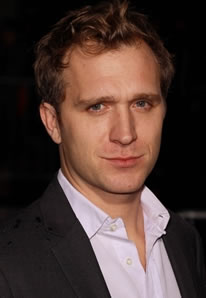
Justin Haythe (Londen, 16 september 1973)
De Finse schrijver en Nobelprijswinnaar Frans Eemil Sillanpää werd geboren in Hämeenkyrö op 16 september 1888. Zie ook mijn blog van 16 september 2006.
Uit: People in the Summer Night (Vertaald door Alan Blair)
“There is almost no summer night in the north; only a lingering evening, darkening slightly as it lingers, but even this darkening has its ineffable clarity. It is the approaching presentiment of the summer morning. When the music of late evening has sunk to a violet, dusky pianissimo, so delicate that it lenghtens into a brief rest, then the first violin awakens with a soft, high cadence in which the cello soon joins, and this inwardly perceived tone picture is supported outwardly by a thousand-tongued accompaniment twittering from a myriad of branches and from the heights of the air. It is already morning, yet a moment ago it was still evening.”

Frans Eemil Sillanpää (16 september 1888 – 3 juni 1964)
